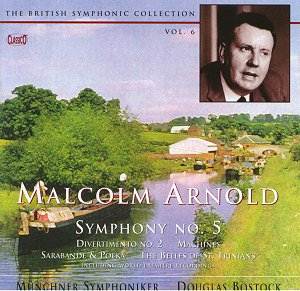MALCOLM ARNOLD:
Symphony No. 5,
Divertimento No. 2,
Symphonic Study: 'Machines',
Sarabande and Polka,
The Belles of St. Trinians.
 Munich Symphony Orchestra
Douglas Bostock.
Munich Symphony Orchestra
Douglas Bostock.
 Classico CLASSCD294
61m DDD.
Classico CLASSCD294
61m DDD.

Buy
through MusicWeb for
£12.50 postage
paid
World-wide.
Immediate delivery
You may prefer to pay by Sterling cheque
to avoid PayPal. Contact for
details
for
details
Purchase
button
This is the sixth volume of CLASSICO's British Symphonic Collection that
has already yielded some most welcome releases of unfamiliar British music.
The most substantial piece is of course the Fifth Symphony (1961). Douglas
Bostock's reading has to compete with three superb performances of the piece
by Hickox (CHANDOS), Handley (CONIFER) and the composer (EMI). Good as this
performance is, it is no match for any of the others. There are many fine
moments in this reading. I find the slow movement and parts of the other
movements particularly successful though the whole performance fails to convince
completely. This may partly be due to the orchestra's comparative unfamiliarity
with the music but also to the acoustics which tend to blur some of the brass'
aggressive interjections that, to me at least, are somewhat lacking in contrasts.
In their readings Hickox and Handley rather emphasized these contrasts,
especially so in the first movement whereas Bostock rather tends to emphasize
the thematic unity of the movement. The result is that he is inclined, as
it were, to soften the edges (if I may put it like that). On the other hand
this is the first reading of the piece which made me notice the importance
of the opening oboe tune on which much of the ensuing music is based. Generally
speaking though I find the brass lacking in bite (good as they are) and
articulation. This is particularly noticeable in the Scherzo and the Finale.
Bostock's reading of the Fifth Symphony may not be to everyone's taste but
it nevertheless offers a quite viable view of this masterpiece in Arnold's
symphonic output.
The shorter pieces fare much better possibly because they require a more
limited concentration than the Fifth does. The Divertimento No. 2 is
the reworking of an earlier Divertimento No. 2 (1950) of which the
central Tango was replaced by the present Nocturne. The Op.
75 work was recorded years ago by the Leicestershire Schools SO (PYE GSGC
14103 - 1967 nla) and has been rarely heard, if at all, since then. It is
vintage lighter Arnold and is comparable to the Little Suites - a short piece
in three contrasted movements, i.e. a brilliant Fanfare, a poetic
Nocturne and an exuberant Chaconne. The Symphonic Study
Machines (1951) is a reworking of music written in 1948 for a documentary
film Report on Steel. It may thus be compared with the Sound Barrier
Rhapsody also derived from an earlier film score, but the music for
Machines is much more integrated in that its final concert shape is
cast rather in the form of a theme and variations than a mere fantasy on
themes from the film as is the case with the Rhapsody. In any case this is
a worthwhile addition to Arnold's steadily expanding discography. Sarabande
and Polka were composed for the ballet devised by Macmillan on the two
sets of English Dances though the dances are played in a different
order. The Sarabande is a dreamy slow dance whereas the Polka
is a rumbustious short Scherzo for wind and percussion imitating, or should
I say, mimicking brass band playing style, particularly so in the middle
section. Bostock is faster than Arnold who again laid more emphasis on contrasts,
especially in the percussion thwacks in the Polka. The suite The
Belles of St Trinians was arranged by the late Christopher Palmer. It
is a very enjoyable trifle, full of colour, humour and orchestral brilliance.
A jolly fine conclusion to this worthwhile release that which Arnoldians
will really want for the shorter, unrecorded pieces even if there are better
performances of the Fifth Symphony available commercially.
Reviewer
Hubert Culot
And Gerald Fenech adds
Here is another volume in the excellent British Symphonic Collection from
Classico, this time focusing on Malcolm Arnold. Coupling his most popular
symphony with rare works was a masterstroke by Douglas Bostock who turns
out extremely well played and interpretatively rich performances of all the
pieces recorded. The Fifth is given a passionate reading, rather similar
to the composer's own on EMI and altogether preferable to Hickox's occasionally
too studied but otherwise excellent account on Chandos. The Munich Orchestra
play with remarkable character for a non-British orchestra and are living
proof of the international appeal of British music. The 2nd Divertimento
is excellently played with a rousing fanfare and a rumbustious Allegro con
spirito that fairly leapt out of my modest speakers. 'Machines' is indeed
Mosolov style but I had myself imagining the huge industry of steel and coal
in the North (after all Arnold came from Northampton) with its ominous grindings
and mix of sweat and tears that is the essence of socially unjust industrialism.
The Sarabande and Polka is delightful and I would relish a complete recording
of the ballet, 'Solitaire'. Finally we have the 'Belles of St Trinians' Suite,
a charmingly descriptive score that perfectly recreates the mood of the film.
Classico have once again called on the inestimable services of Lewis Foreman
for detailed and characterful booklet notes that set the seal on another
outstanding volume from the British Symphonic Collection. I eagerly await
the next issue in this series.
Reviewer
Gerald Fenech
Performance:

Sound:

See also review by Rob
Barnett
The
British Symphonic Collection

![]()